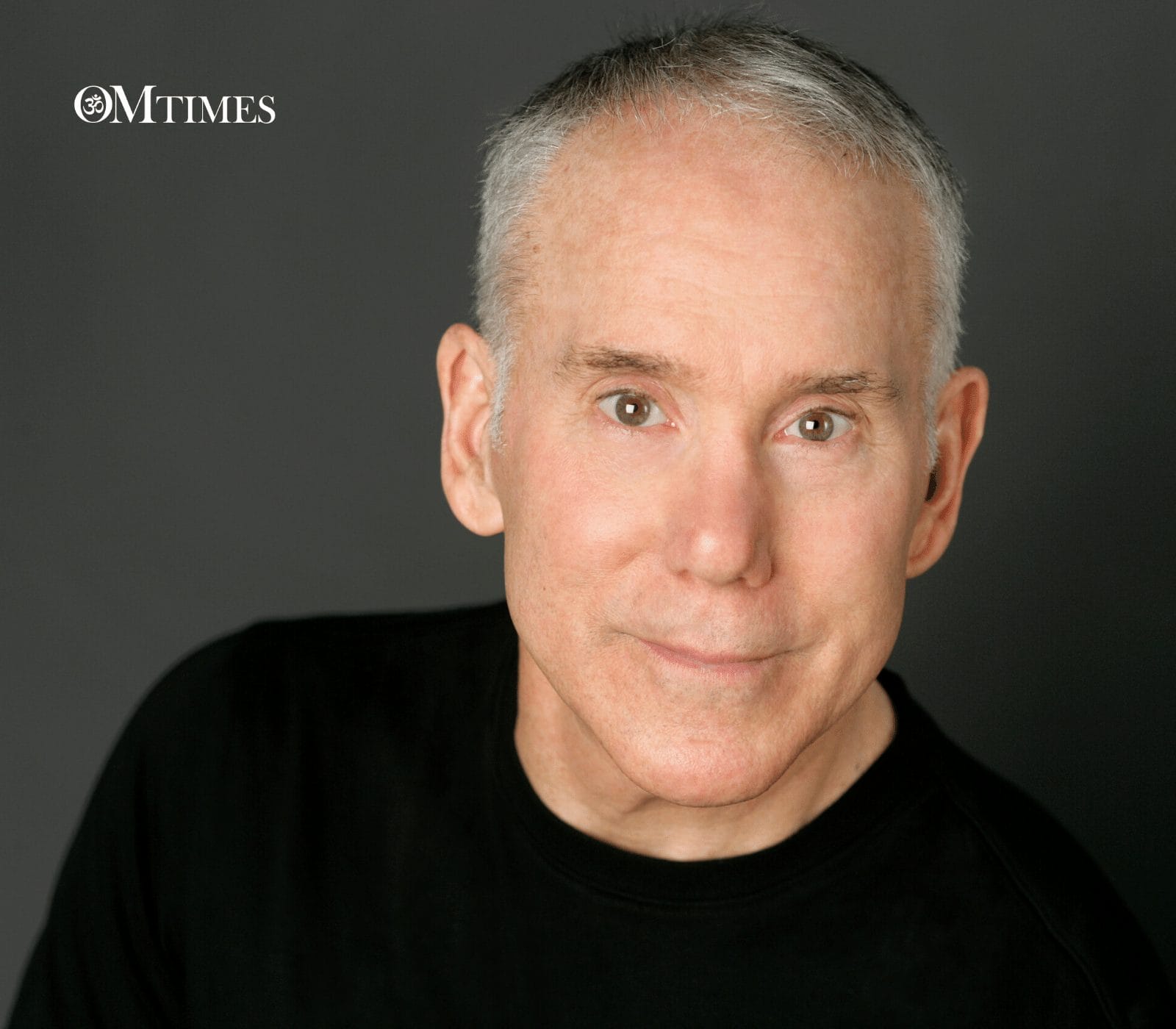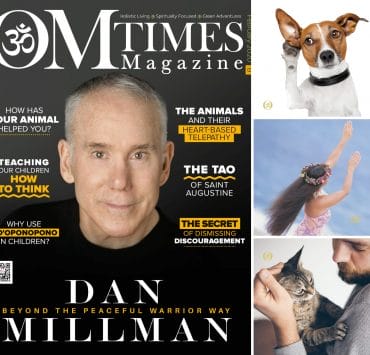Dan Millman: Beyond the Peaceful Warrior Way

So, there’s a time we need to make a decision. There’s a story I tell in one of my books called The Laws of Spirit, where this ageless woman sage asks me to choose when we come to a fork in the road. She says, ‘Please, choose which way you’re going to go,’ and I look in both directions and, finally, I go, ‘you know I think I’ll take that path.’ She says, ‘Thank you, and now please make a decision.’ And I go, ‘Oh, maybe you didn’t hear me, I said I’m going this way.’ She says, ‘Yes, now I’m waiting for your choice.’ And I get a little irritated and finally just start walking, and she says, ‘Ah, thank you.’ We actually make our decisions not up in our head, we make our decisions when we act. In fact, E.M. Forster, a favorite writer of mine, said: ‘How do I know what I think until I see what I do.’
SANDIE SEDGBEER: Yes. Exactly. Another phrase I liked is ‘The challenge of attending to the present.’ You say that much of the time, we humans are bored with the present. We don’t want to stay here.
DAN MILLMAN: Well, there’s a more complicated response to that idea. It has to do with our RAS, our Reticular Activating System, which is located near the brain stem. The RAS has several functions, but it tends to habituate. You notice in society today how people seem to want more; more gourmet or fancier, sweeter or stronger spiced foods? They want more spectacular movies or a stronger emotional event to hold our attention because our attention tends to wander a lot. There are ways to retune the RAS. Meditation and sensory deprivation experiments and practices can help. For example, after a fast, not eating for three to five days or seven days, we can really enjoy the subtle taste of a carrot, a banana, or simple foods. There are ways to retune the RAS so that we are no longer bored with the present moment. We start to actually notice the world again with the eyes of a child. Children are always noticing things. When we travel, we notice things we wouldn’t look at home because we kind of wake up in that way. When most people say they’re bored, it just means they are focusing on the currents of the mind rather than what’s around them and so there are various practices that I occasionally teach to retune that and start to notice and appreciate the subtle and to quiet everything down and appreciate simplicity. I think that’s a fundamental life skill.
SANDIE SEDGBEER: In No Ordinary Moments and you tell the story of when Dan was practicing gymnastics with Socrates watching him, and when shrugged off his jacket afterward and asked Socrates what he thought of the performance, Socrates said ‘that was great, but not the bit where you dropped the jacket on the floor because, at that point, you were no longer engaged at the moment you were in.’
DAN MILLMAN: Exactly. He was reminding me, again, that there are no ordinary moments. Yes, I was paying strict attention when I was flying off the horizontal bar doing somersaults, but when I pulled off my sweatshirt, I wasn’t paying attention. I was treating one moment as special and another as ordinary. But he added something to that—and this is a fundamental life skill and technique anyone can practice—he said: ‘Dan, the difference between us is you practice Gymnastics, I practice everything.; What he was saying was there’s a difference in doing things and practicing them. I mean, we do the dishes and do our homework and do our job at work, but when we are practicing our work and practicing doing the dishes, we have more a sense of intention to improve, to refine, to expand. When we do that, it brings us into that state of flow that makes us more mindful of what we’re doing as we practice.
So, I’m practicing speaking with you right now. I practice breathing on occasion. I practice walking. I practice doing the dishes. My wife says I still have a way to go on that account, but I am working on it. So, when we start to practice life, little by little, we become more absorbed in it and attain a different state of awareness. It’s a simple technique and idea that we can bring into our lives at any time we remember.
SANDIE SEDGBEER: Socrates said this many years ago, and now we have the mindfulness movement, which is trying to remind us all to practice, to be attentive to the present moment.
DAN MILLMAN: Practicing is one way of doing that. The idea, the concept that I am practicing. M mindfulness has become a thing, like a meme, but actually, mindfulness simply means paying attention, but it’s also to the present moment without judgment. So that’s a wonderful life skill practice we’re not taught in school, although our schoolwork can call us to that, can teach us concentration. I remind people of awareness in general. Awareness is consciousness, but it manifests in the human being as attention. That it’s focusing awareness, like a magnifying glass can focus the sun’s power and light. By attending to things, we can also improve that ability. We call it concentration, and like any skill, we can improve on it over time.
SANDIE SEDGBEER: You mentioned The Laws of Spirit in which your character goes on this journey with the female sage he meets. Along the way, she presents 12 Laws. She’s teaching the spiritual principles, the Law of Balance, the Law of Integrity, the Law of Action, etc. Is there one among them that you would rate as being more important than any other?
DAN MILLMAN: The answer is no and yes because one of those Laws may be more important in one moment than another, and so there is no particular hierarchy in it. I do start with the Law of Balance. But the Law I might cover right now is the Law of Action, which is a foundational element in this approach to living that I call The Peaceful Warrior’s Way, and that is that we have less conscious control over the emotions that pass through us.
We have conscious control over the thoughts that appear in our field of awareness. Thoughts happen to us. We don’t say, ‘I think I’m going to think this thought next.’ Thoughts just appear. Random thoughts in our field of awareness, and we don’t have a spam filter in our heads. So, rather than trying to fix our insides so that we can live well, and trying to think positively and have positive emotions, like courage and gratitude and love and so on, we can bring these qualities into life by focusing on what we do. Because we have more control over how we act and behave than we do over what emotions we happen to be feeling or thoughts, we happen to be thinking at any given moment. That is the core of what I call the Law of Action, and that can change our lives. It’s a real form of liberation when we can do what needs to be done despite fear. Whether or not we’re motivated and so on.
A favorite quote of mine that I often remind people of is: “To progress toward the goals, we need to choose one of the two following methods. We can find a way to quiet our mind, create empowering beliefs, raise our self-esteem and practice positive self-talk to find our focus and affirm our power to free our emotions and visualize positive outcomes so that we can develop the confidence to generate the courage, to find the determination, to make the commitment, to feel sufficiently motivated to do whatever it is we need to do.’ Whew, that’s pretty complicated. Or, the second method, which I recommend, is: ‘We can just do it.’ Life is always going to come to that. What will we do? What needs doing at this moment?
SANDIE SEDGBEER: Paradox, humor, and change—these are the three eternal truths on which Socrates founded his message and teachings. He says, ‘the more we accept paradox, humor, and change, the more skilfully we ride the river of reality.’ We are in an unprecedented time of change, and many people are incredibly fearful, so talk to me about paradox, humor, and change.
DAN MILLMAN: Let’s start with change. When things are going well, we don’t want anything to change and usually don’t find any need to change ourselves, either. When things are not going well, then we’re definitely interested in change, and sometimes we take the big step of changing ourselves, which we have more control over than changing the world. Life comes at us in waves of change, which we can’t predict or control, but we can learn to surf those waves. We can learn, like any good martial artist with multiple attackers coming at them, to step aside and use the force that’s coming at us, to make use of that energy. We can learn to do that in everyday life, to make use of change, to turn on a dime and be more adaptable and flexible, which is one of the big benefits of training in certain martial arts where you kind of learn to embody that. So, dealing with change is a major element of life. When we talk about humor, I’m not talking about laughter or telling jokes; I’m talking about cosmic humor. That is fundamentally reaching a point where we don’t take ourselves or our lives quite so seriously in that we realize that life is the kind of game we play. It’s important to play as if it matters, but we have this detachment, this distance from it. It’s almost like going from the foothills of a mountain, where we’re down in the weeds and, suddenly, we find ourselves on the mountain top and we look at the Panorama below, and everything looks more beautiful from a distance.
Continue to page 4 of the Interview with Dan Millman: Beyond the Peaceful Warrior Way
A veteran broadcaster, author, and media consultant, Sandie Sedgbeer brings her incisive interviewing style to a brand new series of radio programs, What Is Going OM on OMTimes Radio, showcasing the world’s leading thinkers, scientists, authors, educators and parenting experts whose ideas are at the cutting edge. A professional journalist who cut her teeth in the ultra-competitive world of British newspapers and magazines, Sandie has interviewed a wide range of personalities from authors, scientists, celebrities, spiritual teachers, and politicians.





